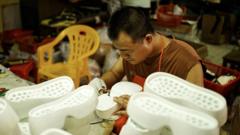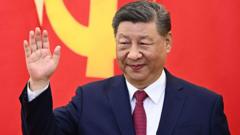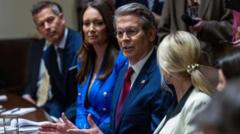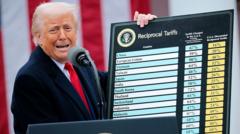European leaders grapple with balancing the impacts of U.S. trade policies while striving to safeguard their economic interests against a potential influx of cheaply produced Chinese goods.
**Europe's Economic Dilemma: Navigating the Impact of U.S. Tariffs on Chinese Goods**

**Europe's Economic Dilemma: Navigating the Impact of U.S. Tariffs on Chinese Goods**
As the U.S. ramps up tariffs on China, European nations brace for the fallout, fearing a surge of cheap imports that threaten their industries.
China's economic persuasiveness has long posed a challenge for European nations, but the recent trade dynamics have heightened concerns significantly. With President Trump's imposition of substantial tariffs on Chinese goods, there is growing anxiety that Europe may become the next battleground for these economic tensions, facing an influx of significantly cheaper products previously intended for the U.S. market.
Europe could encounter a flood of subsidized Chinese commodities such as electric vehicles, electronics, toys, and steel, which could severely impair local manufacturing industries across France, Germany, Italy, and other EU states. As these countries find themselves in the crossfire of a escalating trade conflict between the U.S. and China, their leaders are torn between adopting protective measures and maintaining diplomatic relations with both powers.
“There is a realization across European capitals; Europe must take a stand and protect its local industries,” said Liana Fix, a fellow at the Council on Foreign Relations. This sentiment reflects an imperative among European nations to respond to potential market disruptions.
Ursula von der Leyen, the European Commission president, acknowledged the potential adverse repercussions of American tariffs, asserting her commitment to engaging constructively with China. Additionally, she announced the formation of a new task force to monitor the importation of Chinese goods, specifically looking out for evidence of dumping practices that could undermine the European marketplace.
The looming question remains: how can Europe effectively shield its domestic markets while navigating the delicate diplomatic landscape that U.S.-China relations have created? There is pressure for a multifaceted approach that balances vigilance over imports with ongoing dialogue to mitigate the economic turmoil resulting from these overarching geopolitical tensions.
Europe could encounter a flood of subsidized Chinese commodities such as electric vehicles, electronics, toys, and steel, which could severely impair local manufacturing industries across France, Germany, Italy, and other EU states. As these countries find themselves in the crossfire of a escalating trade conflict between the U.S. and China, their leaders are torn between adopting protective measures and maintaining diplomatic relations with both powers.
“There is a realization across European capitals; Europe must take a stand and protect its local industries,” said Liana Fix, a fellow at the Council on Foreign Relations. This sentiment reflects an imperative among European nations to respond to potential market disruptions.
Ursula von der Leyen, the European Commission president, acknowledged the potential adverse repercussions of American tariffs, asserting her commitment to engaging constructively with China. Additionally, she announced the formation of a new task force to monitor the importation of Chinese goods, specifically looking out for evidence of dumping practices that could undermine the European marketplace.
The looming question remains: how can Europe effectively shield its domestic markets while navigating the delicate diplomatic landscape that U.S.-China relations have created? There is pressure for a multifaceted approach that balances vigilance over imports with ongoing dialogue to mitigate the economic turmoil resulting from these overarching geopolitical tensions.





















